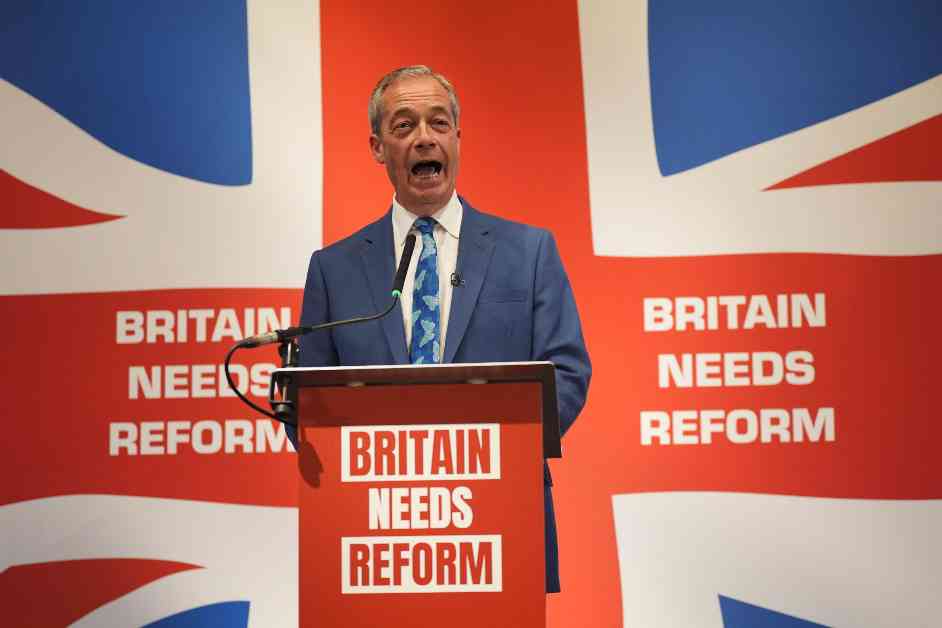Nigel Farage, the leader of Reform UK, has announced his plans to campaign in Scotland in preparation for the upcoming 2026 Holyrood election. With recent polls indicating a surge in support for the party, Farage is determined to make his mark in Scottish politics.
Surveys conducted by the pro-union campaign group Scotland in Union have shown that Reform UK is gaining traction in Scotland, with 9% of the constituency vote and 8% of the regional list vote. This places the party just behind the Scottish Conservatives, who are currently sitting at 11% in the regional list vote.
In an interview with STV News, Farage expressed his commitment to campaigning in Scotland, stating, “I can assure you, Scotland will be seeing me, of that there is no question at all. I think that really, from very little acorns, we’ve made a very good start… I will be in Scotland next year, thinking about planning a year ahead for the Scottish elections.”
Farage also took a jab at the Scottish Conservatives, claiming that “no-one knows what they are, what they stand for.” This criticism comes in the wake of the Survation poll, which has prompted Scottish Tory leadership candidate Murdo Fraser to acknowledge the threat posed by Reform UK. Fraser emphasized the need for real change within the party to address the growing competition from Reform UK.
Reform UK made significant strides in Scotland during the July general election, securing 7% of the vote. With the momentum on their side, Farage and his party are gearing up for a strong showing in the upcoming Holyrood election.
Challenges and Opportunities for Reform UK in Scotland
As Reform UK sets its sights on gaining seats in Holyrood, they face both challenges and opportunities in the Scottish political landscape. The party’s success in the upcoming election will depend on their ability to resonate with Scottish voters and differentiate themselves from established parties like the Scottish Conservatives.
One of the key challenges for Reform UK is their lack of infrastructure and elected representatives in Scotland. Unlike the Scottish Conservatives, who have a strong presence in the region, Reform UK will need to work harder to establish themselves as a viable alternative for Scottish voters. However, this also presents an opportunity for the party to position themselves as a fresh, new voice in Scottish politics.
Another challenge for Reform UK is defining their platform and communicating their policies effectively to the Scottish electorate. Farage’s criticism of the Scottish Conservatives for lacking a clear identity underscores the importance of clarity and consistency in political messaging. Reform UK will need to articulate their vision for Scotland and demonstrate how they can deliver real change for the country.
On the other hand, the recent polls showing increased support for Reform UK indicate that there is a growing appetite for political alternatives in Scotland. With dissatisfaction with the status quo on the rise, there is an opportunity for Reform UK to capitalize on this sentiment and position themselves as a viable option for disenchanted voters.
The Road Ahead: Farage’s Strategy for Scotland
As Nigel Farage prepares to campaign in Scotland for the 2026 Holyrood election, he has outlined his strategy for gaining seats and making an impact in Scottish politics. Farage’s approach will likely involve a combination of grassroots campaigning, media outreach, and targeted messaging to connect with Scottish voters.
One of the key components of Farage’s strategy will be focusing on issues that resonate with Scottish voters and align with Reform UK’s platform. By highlighting their policy priorities and demonstrating how they can address the concerns of Scottish citizens, Farage aims to build support for his party and attract voters who are looking for a fresh approach to politics.
In addition to policy messaging, Farage will also need to leverage his personal brand and political experience to establish credibility and trust with Scottish voters. As a well-known figure in British politics, Farage brings name recognition and visibility to Reform UK, which can help raise the party’s profile in Scotland and attract attention from the media and the public.
Furthermore, Farage will likely seek to capitalize on the momentum from the recent polls showing increased support for Reform UK. By leveraging this momentum and building on their existing base of supporters, Farage aims to position his party as a serious contender in the upcoming election and secure seats in Holyrood.
Conclusion
In conclusion, Nigel Farage’s campaign in Scotland for Reform UK seats at Holyrood represents a significant development in Scottish politics. With polls indicating growing support for the party, Farage and Reform UK are poised to make an impact in the upcoming 2026 election.
As Farage prepares to campaign in Scotland, he faces both challenges and opportunities in the Scottish political landscape. By articulating a clear vision for Scotland, connecting with voters on key issues, and leveraging his political experience, Farage aims to position Reform UK as a viable alternative for Scottish voters.
The road ahead for Farage and Reform UK will be paved with hard work, strategic planning, and a commitment to delivering real change for Scotland. As the 2026 Holyrood election approaches, all eyes will be on Farage and Reform UK as they make their case to the Scottish electorate and vie for seats in the Scottish Parliament.
































